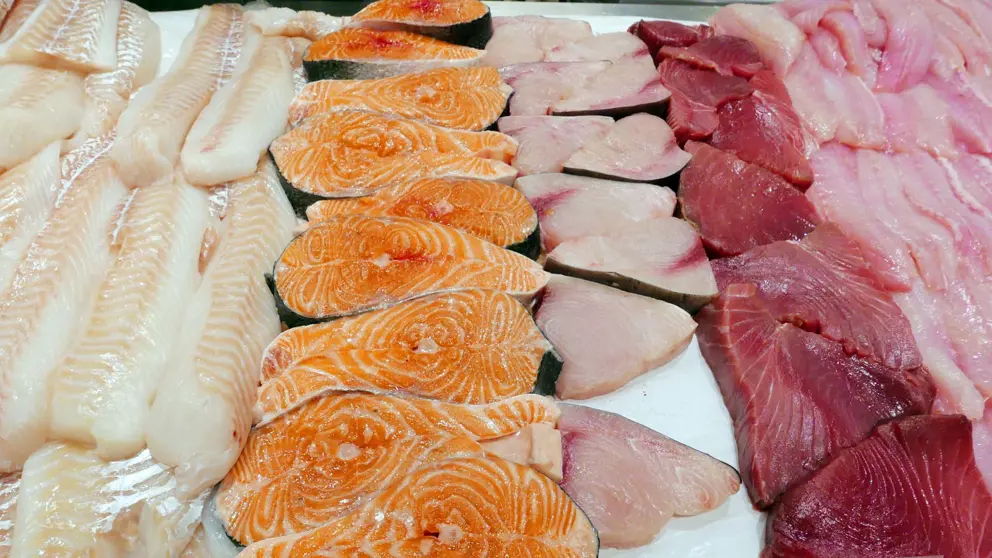You’ve probably heard that fish is a super-healthy choice – it’s high in protein, contains vitamin D and beneficial omega-3 fat. But many Canadians struggle at the fish counter. Wild or farmed? Fresh or frozen? And what about mercury? This guide will help you make wise choices.
Why should I eat fish?
Including fish in your diet comes with many healthy benefits. Studies show that Canadians who eat fish and seafood have healthier overall diets, take in more essential nutrients, and consume less sugar and saturated fats. A study published in 2021 found that having two servings (175 g or about 6 oz) of fish per week was associated with lower risk of events (heart attack, stroke, congestive heart failure, sudden death) for people with existing vascular disease.
Salmon, tuna, shrimp, cod, and crab are the most frequently consumed seafoods in Canada. Of these, salmon and tuna are the highest in omega-3 fat, which is important for maintaining heart health. However, all these are good choices. Fish is also a source of protein, selenium, vitamin B12, vitamin D and iron.
Which fish should I choose?
When considering health, most people want to choose fish that’s higher in omega-3 fat, but low in mercury. There are many great options that fit this description, as highlighted in this chart.
| Type of seafood | Omega-3 | Mercury |
|---|---|---|
| Atlantic salmon | High | Low |
| Wild salmon | High | Low |
| Mackerel - Pacific | High | Low |
| Herring | High | Low |
| Rainbow trout | High | Low |
| Sardines | High | Low |
| Swordfish | High | High |
| Tuna - Albacore | Medium | High |
| Tuna - skipjack/light | Medium | Medium |
| Lobster | Medium | Medium |
| Grouper | Medium | High |
| Sole | Medium | Low |
| Halibut | Medium | High |
| Crab | Low | Low |
| Haddock | Low | Low |
| Cod | Low | Medium |
| Tilapia, farmed | Low | Low |
| Orange roughy | Low | High |
| Shrimp | Low | Low |
| Scallops | Low | Low |
| Omega-3 (mg per 3 oz): High >1000 mg; Medium 200 – 1000 mg; Low <200 mg | ||
| Mercury (PPM): Low <0.1; Medium 0.1-0.4; High 0.5-1 | ||
To avoid excessive intake of mercury, Health Canada advises Canadians to limit consumption of tuna (fresh or frozen), shark, swordfish, escolar, marlin, and orange roughy. Most adults can still eat up to 150 g (just over 5 oz) per week of these fish species combined.
Should I eat farmed or wild fish?
Aquaculture (farming fish) is a huge industry and it’s here to stay. The need for farmed fish grew out of increased demand accompanied by a dwindling fish supply in our waters.
Farming fish raises two nutrition issues:
- Living in close quarters means fish get sick and may require antibiotics. Residues from these medications can end up in the food supply.
- Historically, some fish foods were high in contaminants, which made the fish high in PCBs or other toxins.
As aquaculture has grown, these practices are being regulated to protect human health. The Food and Agriculture Organization of the UN oversees aquaculture regulations in 40 countries, including Canada and the USA.
There are many studies comparing the nutrients in wild and farmed fish, and the results vary greatly. Health Canada deems both types of fish safe to eat, except for any fish that comes with a consumption advisory.
In general, here’s how farmed vs. wild fish compare (based on the Canadian Nutrient File):
- Farmed fish has more omega-3 fat and saturated fat.
- Farmed fish has more calories.
- Vitamin D levels are comparable.
- There are few other differences in terms of vitamin or mineral levels.
- Farmed fish has more antibiotic residue .
- Either type may contain high or low levels of contaminants.
Should I eat fresh or frozen fish?
How “fresh” your fish is depends on how close you live to open waters or aquaculture farms. If there is no fresh fish, opt for frozen varieties. Look for frozen fish that says “frozen at sea” on the package – that means it was caught and flash-frozen quickly, while onboard the ship. Once defrosted, it is undistinguishable from fresh fish. The nutrients remain the same.
Environmental and ethical issues
While we’re focused here on the health aspects of fish, other concerns include sustainability and the treatment of workers in the fishing industry. Here are sources where you can learn more about ethical and environmental concerns around fish:
Healthy fish recipes to try
Whichever fish you choose, aim for a few servings a week for the vitamin D, omega-3 fat and wonderful variety of meals you can create. Try some of our favourite fish recipes:

